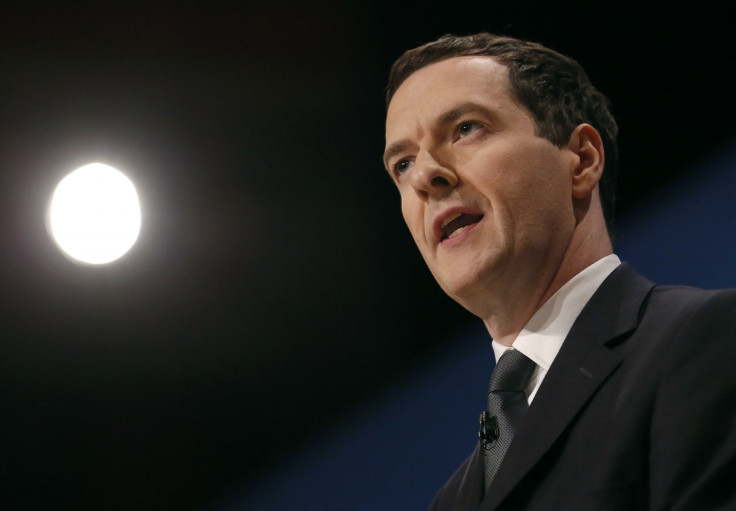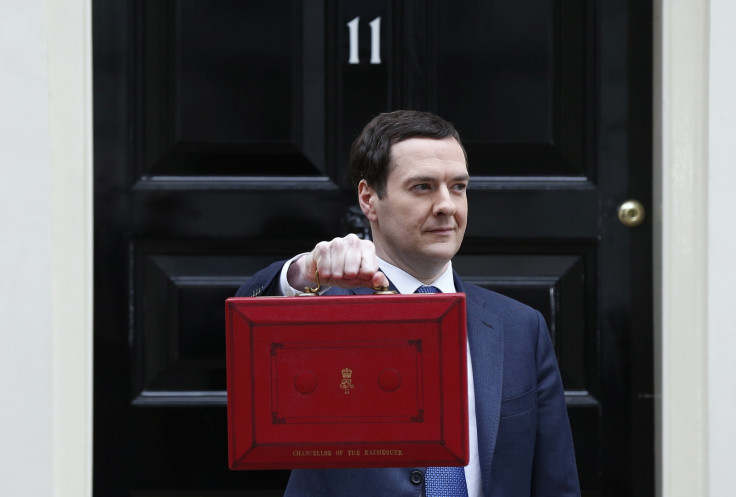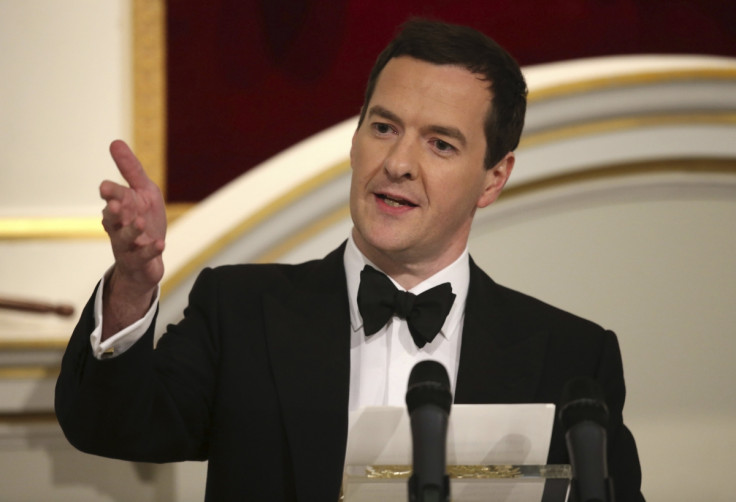Is George Osborne as Good a Chancellor of the Exchequer as he Thinks he is?

George Osborne has now served nearly an entire parliament as Chancellor of the Exchequer.
After almost five years of overseeing the economy in the wake of unprecedented turmoil sparked by the global financial crisis, what state will he be leaving it in if he's kicked out in May 2015?
This is the strongest headline recovery in the Western world.
Forecasts by the likes of the Bank of England, OECD and IMF show the UK economy growing by 3% or better in 2014, making it the fastest growing of any developed Western economy.
And the double dip recession has been revised away in the official statistics. All of this despite the billions of pounds of public spending cuts under the government's austerity programme to balance its finances.
In the immortal opening line of Let's Face the Music and Dance, there may be trouble ahead. The eurozone is facing a renewed economic crisis as deflation looms. The currency bloc – the UK's largest trading partner – could enter recession again. A sanctions war with Russia over the latter's intervention in Ukraine is also hurting Europe, a pain which could spread to the UK.
The deficit is falling more slowly than Osborne hoped.
The whole point of the austerity programme is to close the deficit in the Treasury's finances by reducing public spending. When Osborne took his chancellor job, the deficit was painfully high – equivalent to 11% of GDP. He promised to clear it within one parliament.
Then the eurozone crisis happened, there was another global downturn and the UK economy performed far worse than the Office for Budget Responsibility had forecast – around which Osborne had worked his spending plans.

So tax revenues collapsed, deeper austerity was needed, and Osborne's original deficit plans went kaput. As we approach the 2015 general election, the deficit is still equivalent to around 5.8% of GDP. This is not where Osborne wanted to be at all.
His critics argue he made matters worse for himself by deepening public sector austerity and so withdrawing masses of stimulus out of the economy at a time when it most needed it. Osborne counters that balancing public finances is urgent because they aren't sustainable and threaten the UK's credit rating.
Debt is still rising.
It's sometimes hard to fathom the scale of the UK's public debt. In order to plug the hole in public finances left by the deficit – which, in simple terms, means we don't get as much in as we spend – the UK government has to borrow money. Then it pays interest on that debt, which is another drain on government revenues that would be better allocated elsewhere.
As well as erasing the deficit, Osborne had originally said he would get the debt falling within one parliament. But, as we have just seen, the deficit is still large. Now it looks like the debt – which has hit £1.4tn (€1.79tn, $2.21tn) and is still rising – won't begin to drop until 2018.
Corporation tax revenues are not what Osborne hoped they would be.
In 2010/11, total tax receipts were £447.16m. They had risen alongside the economic recovery to £489.87m in 2013/14. This is a 9.5% increase.
Osborne has argued that his cuts to the corporation tax rate - from 28% in 2010 to 20% in 2015 - will yield more revenues. Partly because fewer companies would try to avoid it and partly because more will be encouraged to set up in the UK because of the lower rates.
The profitability of UK companies has risen over the same period, according to ONS data, from 10.5% in the second quarter of 2010 when Osborne took office to 11.9% in the first quarter of 2014, the latest figures available.
None of this has translated into higher tax receipts. In 2010/11, £42.12m was taken in by HMRC from corporation tax. In 2013/14, despite the recovery and higher profitability, £41.47m was yielded from this tax.
It suggests that firms have increased their profitability by cutting costs, such as pushing down wages, rather than making more money. And others have carried on funnelling them away offshore, despite the sharp fall in the UK's rate.
Unemployment is falling sharply, but productivity and wage growth are still awful.
Under Osborne, the unemployment rate has fallen to 6% in the three months to August 2014, its lowest since 2008. All the while, employment has hit all-time-highs and the claimant count dropped.
But productivity – output per hour worked – is falling. It's still around 4.5% below its pre-financial crisis peak, even though GDP has surpassed its pre-crisis peak.
In real terms, wages are also falling and well below pre-crisis levels. In October, pay excluding bonuses rose 0.9% over the year. This is against consumer price inflation of 1.2%. In other words, prices are going up more quickly than pay.
Though policymakers are puzzled about why productivity is so weak, a number of theories have been posited. At their heart is the idea that there is more labour market slack than previously thought – more available workers. This then depresses wages, which in turn weighs on productivity.
For example, pension changes have left many older workers retiring later because they need to work for longer. And job seekers are more aggressively pushed into finding work by cuts to their benefits and the threat of their withdrawal if no employment is found.
House price growth seems to be slowing.
One of the key drivers of the economic recovery has been a revival of the mortgage market, which in turn triggered an increase in construction sector output as builders make more homes to profit from rising house prices.

Low interest rates and schemes such as Help to Buy – initiated by Osborne – have made getting a mortgage cheaper and easier. So demand for housing increased. This drove up house prices because of a dearth in the supply of homes.
Higher house prices and low interest rates meant people were taking on large mortgages, a risk when rates rise because they may struggle to cope with higher repayments. So the Financial Conduct Authority and Bank of England have tightened mortgage lending rules to stop riskier loans from being approved.
Mortgage approvals in September slumped to a 14 month low at 61,267. And the rapid pace of house price growth – which has seen an annual average rate for the UK of as high as 11% in recent months – appears to have slowed markedly. Halifax said the average price of a UK house fell by 0.4% over the month in October, to £186,135.
Osborne stoked the housing market recovery, which helped fuel a rise in consumer spending. But while bathing in its warm glow, he might get burnt. If house price growth slows to a halt, consumer spending will likely slow too. Given household consumption's leading role in the UK economic recovery, this would be a significant problem.
We're not exporting anywhere near what we should be.
Osborne has constantly trumpeted the need to rebalance the UK economy away from its reliance on household consumption (despite the fact his recovery relies so heavily on it) and towards exports. He even set a target value of £1tn for UK exports by the end of the decade, a goal most economists expect him to miss.
Despite export finance schemes and diplomatic efforts to drum up trade across the world, UK exports have been disappointing. Global demand has been subdued by the European economic crisis and a slowdown in powerhouse China. Moreover, the strength of sterling against other currencies has made importing from the UK far less attractive to foreign buyers.
Official data showed that the deficit on goods and services widened to £2.8bn in September, a big increase on August's revised figure of £1.8bn and much worse than economists had expected.
Osborne will be nervous about the timing of an interest rates hike.
As long as the recovery holds itself together at the seams before the May 2015 general election, Osborne can sleep relatively easily. There may be a few bumps and blips along the way, but these can be ridden out and dismissed as out of the chancellor's hands.
What might make it burst is higher interest rates. The Bank of England is expected to raise its base rate from 0.5%, an all-time-low, at some point in 2015. This had originally been expected by analysts to come in the spring time, though given the recent headwinds for the UK economy and on-going productivity/wage weakness, these expectations have been delayed to mid-2015.
Mark Carney, governor of the Bank of England, has said repeatedly that any rates rise will be gradual and incremental in order to stave off any shocks. What Osborne really wants is for this to happen after the election.
Even if the base rate increase is fractional, it will still lift interest rates across the economy. This means higher repayments every month for households with debt – mortgages, personal loans, car finance, etc – and so will suck money away from spending in the economy.
What's more, businesses who are already struggling to secure credit from the bank will face higher interest rates. And those with existing variable-rate debt will spend more on paying this down rather than on higher wages, jobs and increasing production.
If this were to happen before the election, Osborne's fragile recovery may begin to crack under the pressure. And so will the platform on which he's trying to win votes.
© Copyright IBTimes 2025. All rights reserved.






















